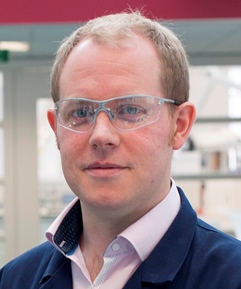Events
Guest Seminar "Tuning Properties and Functionality in the Modulated Self-Assembly of Metal-Organic Frameworks", Prof Ross Forgan, Professor of Supramolecular and Materials Chemistry at the University of Glasgow.

Prof Forgan
| Date: | Wednesday 20 July 2022 10:30 - 12:00 |
| Location: | SEMS Seminar Room |
Biography
Prof Ross Forgan is Professor of Supramolecular and Materials Chemistry at the University of Glasgow. He graduated from the University of Edinburgh under the supervision of Prof Peter Tasker in 2008, he held PDRA positions in the groups of the Nobel Laureate Prof Sir J Fraser Stoddart at Northwestern University, and Prof Lee Cronin at the University of Glasgow, where he later received prestigious fellowships, such as the Royal Society University Research Fellowship and an ERC Starting Grant. He is President of the Porous Materials Interest Group of the Royal Society of Chemistry. His research into the application of metal-organic frameworks in biomimetic catalysis and nanoscale drug delivery is underpinned by fundamental studies into molecular recognition and self-assembly processes inside nanoporous materials.
Abstract
Tuning Properties and Functionality in the Modulated Self-Assembly of Metal-Organic Frameworks
Ross S. Forgan, WestCHEM School of Chemistry, University of Glasgow, University Avenue, Glasgow G12 8QQ, UK. / E-mail: Ross.Forgan@glasgow.ac.uk
Metal-organic frameworks (MOFs) are network materials comprised of organic ligands connected by metal ion clusters into multidimensional structures that often have permanent porosity. Their chemically addressable structures, combined with their ability to store large quantities of small molecules within their pores, have led to applications in gas storage, heterogeneous catalysis, sensing, and drug delivery, amongst others. Coordination modulation, the addition of monomeric modulators to synthetic mixtures, can tune particle size from nanometres to centimetres, through capping of crystallites (decreasing size) or coordinative competition with ligands (increasing size).
The talk will cover the development of our own modulation techniques for a range of trivalent and tetravalent MOFs, describing the versatility of modulation in controlling physical properties such as interpenetration, defectivity, and porosity.1 Our techniques provide access to high quality single crystals of many different MOFs, allowing the subsequent characterisation of their mechanical properties,2 flexibility upon guest uptake,3 single-crystal to single-crystal postsynthetic modification,4 and development of fluorescent sensors.5 Additionally, we will show that protocols can be tuned to downsize materials, producing nanoparticles with fine control of surface chemistry, allowing the assembly of pH-responsive6 and organelle targeted7 drug delivery devices.
| People: |

